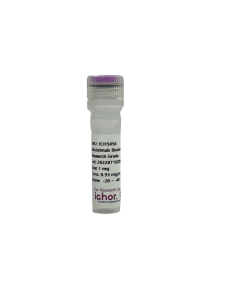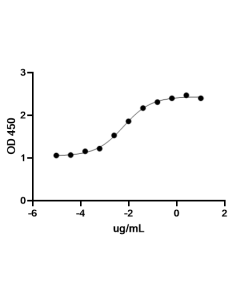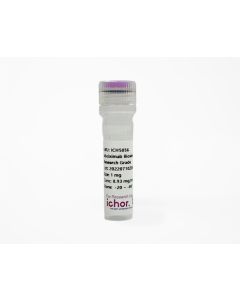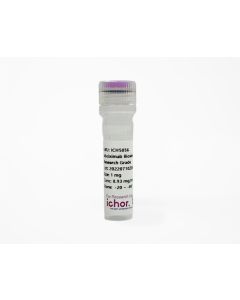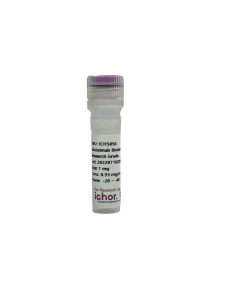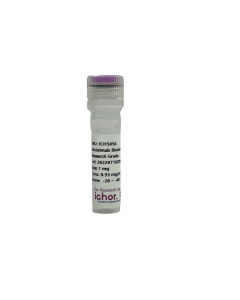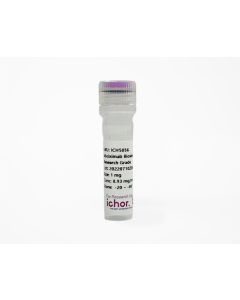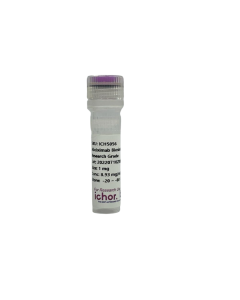Anti-Mouse CD105 (MJ7/18) In Vivo Antibody- Low Endotoxin
Anti-Mouse CD105 In Vivo Antibody - Low Endotoxin (MJ7/18)
Product Benefits:
ichorbio's anti-Mouse CD105 In Vivo Antibody (MJ7/18) - Low Endotoxin [ICH1191] is manufactured in a cGMP compliant, ISO Quality Standard 9001:2015 facility. ichorbio's low endotoxin antibodies have half the endotoxin of comparable antibodies from Bio X Cell at less than 1.0 EU/mg. If ichorbio's low endotoxin antibodies are not low enough we also offer ultra low endotoxin antibodies which have even less endotoxin (<0.5EU/mg) at an even higher purity (98% versus 95%). ichorbio: the best antibodies for in vivo research.
Target:
CD105
Clone:
MJ7/18
Size:
ichorbio's MJ7/18 in vivo antibody is available in the following bulk sizes: 5mg, 25mg, 50mg and 100mg. ichorbio regularly manufactures multi-gram amounts of our anti-mouse CD105 MJ7/18 clone - please contact us for pricing.
Isotype:
IgG2a kappa
Other Names:
Endoglin, Ancillary TGF-beta Receptor
Host:
Rat
Species Reactivity:
Mouse
Specificity:
MJ7/18 activity is directed against mouse CD105 (endoglin).
Antigen Distribution:
CD105 is alternatively spliced, resulting in both long (L-endoglin) and short (S-endoglin) forms. The predominant isoform, L-endoglin, promotes the proliferation and migration of endothelial cells via enhanced ALK1-Smad1/5 signaling and is the presumed isoform when not specified in the literature. In contrast, S-endoglin enhances ALK5-Smad2/3 signaling. Endoglin has specific receptor-ligand interactions between type I and type II TGF-β superfamily receptors when binding TGF-β superfamily ligands. Mouse CD105 has three separate regions of similarity to TGF-β receptor III but does not contain the RGD tripeptide found in human CD105.
Background:
CD105 (endoglin) is a TGF-β superfamily co-receptor that promotes angiogenesis, is involved in endothelial integrin-mediated mural cell and leukocyte adhesion, antagonizes TGF-β mediated ERK activation, is essential to the immune response of macrophages, regulates trophoblast differentiation and invasion during pregnancy, promotes T-cell proliferation, and regulates differentiation and collagen expression in myofibroblasts.
Immunogen:
MJ7/18 was produced by immunizing rats with inflamed mouse skin and selecting for reactivity with endothelial cells. MJ7/18 predominantly stains vascular endothelial cells and is a marker of mouse endothelium
Concentration:
1.0 - 5.0 mg/ml
Formulation:
0.01 M phosphate buffered saline (PBS) pH 7.2, 150 mM NaCl with no carrier protein, potassium or preservatives added. BSA and Azide free.
Purity:
>95% by SDS-PAGE and HPLC
>98% by SDS-PAGE and HPLC
Endotoxin:
<1.0 EU/mg as determined by the LAL method
≤ 0.75 EU/mg as determined by the LAL method
Aggregation:
Aggregation level ≤ 5%
Aggregation level ≤ 1%
IMPACT Pathogen Test:
We use the IMPACT test generated by IDEXX Laboratories to guarantee our Ultra Low Endotoxin antibodies are pathogen free. Our mouse antibodies are tested for: Mycoplasma spp., Mycoplasma pulmonis, Sendai virus, Mouse hepatitis virus, Pneumonia virus of mice, Minute virus of mice, Mouse parvovirus (MPV1-5), Theiler's murine encephalomyelitis virus, Murine norovirus, Reovirus 3, Mouse rotavirus, Ectromelia virus, Lymphocytic choriomeningitis virus, Polyoma virus, Lactate dehydrogenase-elevating virus, Mouse adenovirus (MAD1, MAD2), Mouse cytomegalovirus K virus, Mouse thymic virus, Hantaan virus, Corynebacterium bovis, Corynebacterium spp. (HAC2)
Storage:
Anti-Mouse CD105 In Vivo Antibody (MJ7/18) is stable for at least one week when stored sterile at 2-8°C. For long term storage aseptically aliquot in working volumes without diluting and store at –20°C in a manual defrost freezer. Avoid Repeated Freeze Thaw Cycles.
Applications:
Agonist, Cell Separation, ELISA, Flow Cytometry, Immunofluorescence, IF Microscopy, Immunohistochemistry, IHC FF, Immunoprecipitation, LCI, Western Blot
Application Notes: Each investigator should determine their own optimal working dilution for specific applications. Use:
Products are for research use only.
Isotype Control:
Rat IgG2a In Vivo isotype control - Low Endotoxin [ICH2244]
Alternative Names:
- AI528660 antibody
- AI662476 antibody
- CD 105 antibody
- CD105 antibody
- CD105 antigen antibody
- EGLN_HUMAN antibody
- END antibody
- Endoglin antibody
- Eng antibody
- FLJ41744 antibody
- HHT1 antibody
- ORW antibody
- ORW1 antibody
- Osler Rendu Weber syndrome 1 antibody
- RP11 228B15.2 antibody
- S endoglin antibody
- S-endoglin antibody
- SN6 antibody

